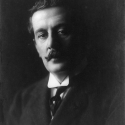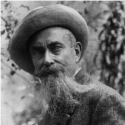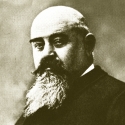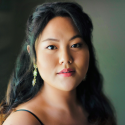Tosca

|
Giacomo PucciniComposer |
Giacomo Puccini, in full Giacomo Antonio Domenico Michele Secondo Maria Puccini, (born December 22, 1858, Lucca, Tuscany [Italy]—died November 29, 1924, Brussels, Belgium), Italian composer, one of the greatest exponents of operatic realism, who virtually brought the history of Italian opera to an end. His mature operas included La Bohème (1896), Tosca (1900), Madama Butterfly (1904), and Turandot (left incomplete).
Puccini was the last descendant of a family that for two centuries had provided the musical directors of the Cathedral of San Martino in Lucca. Puccini initially dedicated himself to music, therefore, not as a personal vocation but as a family profession. He was orphaned at the age of five by the death of his father, and the municipality of Lucca supported the family with a small pension and kept the position of cathedral organist open for Giacomo until he came of age. He first studied music with two of his father’s former pupils, and he played the organ in small local churches. A performance of Giuseppe Verdi’s Aida, which he saw in Pisa in 1876, convinced him that his true vocation was opera. In the autumn of 1880 he went to study at the Milan Conservatory, where his principal teachers were Antonio Bazzini, a famous violinist and composer of chamber music, and Amilcare Ponchielli, the composer of the opera La gioconda. On July 16, 1883, he received his diploma and presented as his graduation composition Capriccio sinfonico, an instrumental work that attracted the attention of influential musical circles in Milan. In the same year, he entered Le villi in a competition for one-act operas. The judges did not think Le villi worthy of consideration, but a group of friends, led by the composer-librettist Arrigo Boito, subsidized its production, and its premiere took place with immense success at Milan’s Verme Theatre on May 31, 1884. Le villi was remarkable for its dramatic power, its operatic melody, and, revealing the influence of Richard Wagner’s works, the important role played by the orchestra. The music publisher Giulio Ricordi immediately acquired the copyright, with the stipulation that the opera be expanded to two acts. He also commissioned Puccini to write a new opera for La Scala and gave him a monthly stipend: thus began Puccini’s lifelong association with Giulio Ricordi, who was to become a staunch friend and counselor.
After the death of his mother, Puccini fled from Lucca with a married woman, Elvira Gemignani. Finding in their passion the courage to defy the truly enormous scandal generated by their illegal union, they lived at first in Monza, near Milan, where a son, Antonio, was born. In 1890 they moved to Milan, and in 1891 to Torre del Lago, a fishing village on Lake Massaciuccoli in Tuscany. This home was to become Puccini’s refuge from life, and he remained there until three years before his death, when he moved to Viareggio. But living with Elvira proved difficult. Tempestuous rather than compliant, she was justifiably jealous and was not an ideal companion. The two were finally able to marry in 1904, after the death of Elvira’s husband. Puccini’s second opera, Edgar, based on a verse drama by the French writer Alfred de Musset, had been performed at La Scala in 1889, and it was a failure. Nevertheless, Ricordi continued to have faith in his protégé and sent him to Bayreuth in Germany to hear Wagner’s Die Meistersinger.
Puccini returned from Bayreuth with the plan for Manon Lescaut, based, like the Manon of the French composer Jules Massenet, on the celebrated 18th-century novel by the Abbé Prévost. Beginning with this opera, Puccini carefully selected the subjects for his operas and spent considerable time on the preparation of the librettos. The psychology of the heroine in Manon Lescaut, as in succeeding works, dominates the dramatic nature of Puccini’s operas. Puccini, in sympathy with his public, was writing to move them so as to assure his success. The score of Manon Lescaut, dramatically alive, prefigures the operatic refinements achieved in his mature operas: La Bohème, Tosca, Madama Butterfly, and La fanciulla del west (1910; The Girl of the Golden West). These four mature works also tell a moving love story, one that centres entirely on the feminine protagonist and ends in a tragic resolution. All four speak the same refined and limpid musical language of the orchestra that creates the subtle play of thematic reminiscences. The music always emerges from the words, indissolubly bound to their meaning and to the images they evoke. In Bohème, Tosca, and Butterfly, he collaborated enthusiastically with the writers Giuseppe Giacosa and Luigi Illica. The first performance (February 17, 1904) of Madama Butterfly was a fiasco, probably because the audience found the work too much like Puccini’s preceding operas.
In 1908, having spent the summer in Cairo, the Puccinis returned to Torre del Lago, and Giacomo devoted himself to Fanciulla. Elvira unexpectedly became jealous of Doria Manfredi, a young servant from the village who had been employed for several years by the Puccinis. She drove Doria from the house threatening to kill her. Subsequently, the servant girl poisoned herself, and her parents had the body examined by a physician, who declared her a virgin. The Manfredis brought charges against Elvira Puccini for persecution and calumny, creating one of the most famous scandals of the time. Elvira was found guilty, but through the negotiations of the lawyers was not sentenced, and Puccini paid damages to the Manfredis, who withdrew their accusations. Eventually the Puccinis adjusted themselves to a coexistence, but the composer from then on demanded absolute freedom of action.
The premiere of La fanciulla del west took place at the Metropolitan in New York City on December 10, 1910, with Arturo Toscanini conducting. It was a great triumph, and with it Puccini reached the end of his mature period. He admitted “writing an opera is difficult.” For one who had been the typical operatic representative of the turn of the century, he felt the new century advancing ruthlessly with problems no longer his own. He did not understand contemporary events, such as World War I. In 1917 at Monte-Carlo in Monaco, Puccini’s opera La rondine was first performed and then was quickly forgotten.
Always interested in contemporary operatic compositions, Puccini studied the works of Claude Debussy, Richard Strauss, Arnold Schoenberg, and Igor Stravinsky. From this study emerged Il trittico (The Triptych; New York City, 1918), three stylistically individual one-act operas—the melodramatic Il tabarro (The Cloak), the sentimental Suor Angelica, and the comic Gianni Schicchi. His last opera, based on the fable of Turandot as told in the play Turandot by the 18th-century Italian dramatist Carlo Gozzi, is the only Italian opera in the Impressionistic style. Puccini did not complete Turandot, unable to write a final grand duet on the triumphant love between Turandot and Calaf. Suffering from cancer of the throat, he was ordered to Brussels for surgery, and a few days afterward he died with the incomplete score of Turandot in his hands.
Turandot was performed posthumously at La Scala on April 25, 1926, and Arturo Toscanini, who conducted the performance, concluded the opera at the point Puccini had reached before dying. Two final scenes were completed by Franco Alfano from Puccini’s sketches.
Solemn funeral services were held for Puccini at La Scala in Milan, and his body was taken to Torre del Lago, which became the Puccini Pantheon. Shortly afterward, Elvira and Antonio were also buried there. The Puccini house became a museum and an archive.

|
Luigi IllicaLibrettist |
Luigi Illica (1857 – 1919) was an Italian librettist who wrote for Giacomo Puccini (usually with Giuseppe Giacosa), Pietro Mascagni, Alfredo Catalani, Umberto Giordano, Baron Alberto Franchetti and other important Italian composers. His most famous opera libretti are those for La Bohème, Tosca, Madama Butterfly and Andrea Chénier.
Illica was born at Castell'Arquato. His personal life sometimes imitated his libretti. The reason he is always photographed with his head slightly turned is because he lost his right ear in a duel over a woman. When silent films based on Illica's operas were made, his name appeared in large letters on advertisements because distributors could only guarantee that his stories would be used, and not that they would be accompanied by the music of the appropriate composer.
As a playwright of considerable quality, he is today remembered through one of Italy's oldest awards, the Luigi Illica International Prize founded in 1961, which goes to world famous opera singers, opera conductors, directors and authors. The Award is now awarded every two years and alternates with the Illica Opera Stage International Competition, which offers prizes and debut opportunities to young singers.

|
Giuseppe GiacosaLibrettist |
Giuseppe Giacosa (1847 – 1906) was an Italian poet, playwright and librettist. He was born in Colleretto Parella, now Colleretto Giacosa, near Turin. His father was a magistrate. Giuseppe went to the University of Turin, studying in the University of Turin, Faculty of Law. Though he gained a degree in law, he did not pursue a legal career.
He gained initial fame for his play Una Partita a Scacchi ("A Game of Chess") in 1871. His main field was playwriting, which he accomplished with both insight and simplicity, using subjects set in Piedmont and themes addressing contemporary bourgeois values. He wrote La signora di Challant (La Dame de Challant, The Lady of Challand), based on a novella by Matteo Bandello, for noted French actress Sarah Bernhardt, produced in New York in 1891.
Giacosa wrote the final polished version of the libretto for Giacomo Puccini's Manon Lescaut, which had been begun by Ruggero Leoncavallo, Marco Praga, Domenico Oliva, and Luigi Illica. He also wrote the librettos used by Puccini for La Bohème, Tosca and Madama Butterfly in conjunction with Luigi Illica. Illica supplied the plot and dialogue, and Giacosa polished the libretto into verses.

|
Stephanie HaveyStage Director |
Winner of the Adelaide Bishop award for artistic quality and winner of the Opera America Director-Designer Showcase, Stephanie Havey has staged productions for Pittsburgh Opera, Michigan Opera Theatre, Arizona Opera, Atlanta Opera, Opera Omaha, New York City Opera, North Carolina Opera, and Hawaii Opera Theatre, as well as new productions of La rondine for The Curtis Institute of Music, Tosca for the Lyrique-en-mer International Festival de Belle-Ile, The Crucible for Opera Santa Barbara, Shining Brow for Tulsa Opera, Il matrimonio segreto for Carnegie Mellon University, Rigoletto for Syracuse Opera, Falstaff for Resonance Works Pittsburgh, and Gluck’s Armide for OperaNeo. She also has been a member of the staging staff at San Francisco Opera and The Santa Fe Opera.
Engagements for the 2019/20 COVID-19 affected season included Seattle Opera, Houston Grand Opera, Opera de Montreal, a new production of Norma for Boston Lyric Opera, La Traviata with Hawaii Opera Theatre, returning to the Pittsburgh Opera for Norma and Florencia en el Amazonas, and La bohème for Charlottesville Opera. This season’s engagements include Il barbiere di Siviglia with Finger Lakes Opera as well as postponed or cancelled productions of Carmen with Arizona Opera, The Pirates of Penzance and Rigoletto with Virginia Opera, and Eugene Onegin with Minnesota Opera.
Havey was selected to participate in San Diego Opera’s theatre innovation project “Opera Hack,” a two-year project funded by an Opera America Innovation Grant to discover new ways for technology to be used in the production and presentation of opera. She also had the honor of hosting the 2019 Opera America Director-Designer Showcase at the National Conference in San Francisco as a returning alumna.
Havey is a frequent collaborator for the development of new opera, staging new works with Opera Philadelphia for their Double Exposure event, Opera America’s New Works Forum, and as the Resident Stage Director for North American New Opera Workshop.
During her two seasons as the first Resident Artist Stage Director for the Pittsburgh Opera, she received rave reviews for her new production of Il matrimonio segreto and directed numerous productions and a staged recital series in the Opera Studio. Other professional engagements include Central City Opera, Glimmerglass Festival, Sarasota Opera, Virginia Opera, and Nashville Opera.
Havey has been a guest instructor for Young Artist training programs including Curtis Institute of Music, Oberlin Conservatory of Music, NYU Tisch School of the Arts, Carnegie Mellon University, Central City Opera, Tulsa Opera, OperaNeo, Opera North, University of Delaware, and the Florida State Opera.

|
Daniela CandillariConductor |
Serbian-born conductor Daniela Candillari continues to garner praise for her dynamic and compelling performances at opera houses and concert stages throughout North America and Europe. Recognized for her “confidence and apparently inexhaustible verve” (The New York Times) and “powerful and breathtaking performances” (Review STL), Candillari enters her second season as both Principal Conductor at Opera Theatre of Saint Louis and Principal Opera Conductor at Music Academy of the West.
Candillari’s 2022/23 Season featured two major New York debuts – first with the New York Philharmonic in their inaugural season inside the new David Geffen Hall conducting cellist Yo-Yo Ma in Elgar’s Cello Concerto, followed by her Carnegie Hall debut with the American Composers Orchestra in a program of premieres by George Lewis, Ellen Reid, and Jihyun Noel Kim. Additional symphonic performances included the Orchestre Métropolitain Montreal with Dvořák’s 7th Symphony, as well as the Toledo Symphony Orchestra for a program featuring Women in Classical Music. On the operatic stage, Candillari debuted with Deutsche Oper Berlin for performances of Lakmé and New Orleans Opera for Hansel and Gretel. Candillari conducted Tosca at both Arizona Opera and Opera Theatre of Saint Louis, a Gala concert version of Aida for Tulsa Opera, as well as a world premiere of Arkhipov by Peter Knell and Stephanie Fleischmann at the Kirk Douglas Theatre.
During the 2021/22 Season, Candillari made her Metropolitan Opera debut conducting Matthew Aucoin’s Eurydice. Candillari also led a new production of Jeanine Tesori’s Blue with Detroit Opera, and workshopped the composer’s Grounded with Washington National Opera and The Met Opera. Other engagements included leading Terence Blanchard’s Fire Shut Up in My Bones at the Lyric Opera of Chicago; Carmen at Opera Theatre of Saint Louis; the North American premiere of Caroline Shaw, Andrew Yee, and Asma Maroof’s Moby Dick; or The Whale at The Shed with members of the New York Philharmonic; Eugene Onegin at Music Academy of the West; and a concert with the Juilliard Pre-College Symphony. Candillari led the made-for-film world premiere of Clint Borzoni’s The Copper Queen with Arizona Opera, released in 2021, as well as the film of Ana Sokolović’s Svadba with Boston Lyric Opera that came out in early 2022.
Other recent highlights include Candillari debuting with the New York Philharmonic conducting Virgil Thomson’s The Mother of Us All at The Metropolitan Museum of Art, co-produced by The Juilliard School; with Opera Theatre of Saint Louis and the Saint Louis Symphony; Lyric Opera of Chicago for the Chicago premiere of Gregory Spears’ Fellow Travelers in 2018 and Jack Perla’s An American Dream in 2019; and LA Opera for Ellen Reid’s Pulitzer Prize-winning opera, prism. Candillari conducted the West Coast premiere of Jennifer Higdon’s Cold Mountain at Music Academy of the West; debuted with Opera Philadelphia in a new production of Rene Orth’s Empty the House; made her mainstage debut at Arizona Opera conducting Spears’ Fellow Travelers, which she also led in a previous season with Minnesota Opera; helmed acclaimed performances of Acquanetta with PROTOTYPE Festival; and made her Asian debut in Hong Kong conducting Du Yun’s Pulitzer Prize-winning opera, Angel’s Bone. Candillari additionally appeared in concert with Trinity Wall Street’s NOVUS NY Festival to open their 2018 season in celebration of Leonard Bernstein’s Centennial.
As a composer, Candillari has been commissioned by established artists including instrumentalists from the Boston, Cleveland, Detroit, and Pittsburgh Symphonies, as well as the three resident orchestras of Lincoln Center: The Metropolitan Opera Orchestra, the New York Philharmonic, and the New York City Ballet. An avid educator, Candillari is deeply involved with Music Academy of the West’s programming for young artists, and has recently participated in master classes and discussions at DePaul University and Chicago Humanities Festival.
Candillari grew up in Serbia and Slovenia. Candillari holds a Doctorate in Musicology from the Universität für Musik in Vienna, a Master of Music in Jazz Studies from the Indiana University Jacobs School of Music, and a Master of Music and Bachelor’s degree in Piano Performance from the Universität für Musik in Graz. A Fulbright Scholarship recipient, Candillari was also awarded a TED Fellowship.

|
Gregory Allen HirschLighting Designer |
Gregory Allen Hirsch is a Lighting Designer who works extensively in the worlds of Broadway, Off-Broadway, National Tours, and Opera. He's won two Drama-logue Awards, a Bay Area Theatre Critics Circle Award, and an Emmy Award for his lighting designs. He has lit such luminaries as Richard Kiley, Robert Goulet, Yul Brynner, Joan Diener, John Cullum, Raul Julia, Tommy Chong, Sammy Davis, Jr., Beverly Sills, The Kids in the Hall, Gilda Cruz-Romo, Julius LaRosa, and Theodore Bikel. For Arizona Opera he has designed Carmen, A Little Night Music, Riders of the Purple Sage, La Bohème, La Traviata, Tosca, Barber of Seville, La Cenerentola, Charlie Parker’s Yardbird, and Madame Butterfly.

|
Alita LopezWig & Makeup Designer |
A native of Tucson, Alita Lopez began her career with Arizona Opera in 2001 working as a makeup artist. After just a few seasons, she became assistant to the former Wig Master. In this position she learned the art of wig building and developed her skill as a stylist. In 2010, she took on the title of Wig Master and has been overseeing the hair and makeup department at Arizona Opera ever since. In addition to managing her crew, she utilizes her creativity and talent as an artist and designer to aide each director in the realization of their vision.

|
Mario PachecoAssistant Stage Director |
Mario Pacheco is an emerging Canadian stage director hailing from Hamilton, Ontario. He is a graduate of Sheridan College’s Honours Bachelor of Music Theatre Performance program and is currently pursuing the University of Toronto’s Artist Diploma in Operatic Stage Direction under the mentorship of Michael Albano. Assistant directing credits include This is Prophetic with Against the Grain Theatre/UofT Opera, La bohème with Brott Opera, Britten’s A Midsummer Night’s Dream with Opera NUOVA, and Le nozze di Figaro with Western University Opera. Most recently, Pacheco directed Il segreto di Susanna, The Bear, and Bon Appétit! for the University of Toronto Opera Division. Future engagements include directing the student composer collective, Disobedience, as well as assisting on Il barbiere di Siviglia and Aaron Copland’s The Tender Land, directed by Tim Albery for The University of Toronto Opera Division.

|
Bradley TaylorAssistant Lighting Designer |
Bradley Taylor is currently in his second season as the Production Manager and Lighting Supervisor at Arizona Opera. He began serving as the Assistant Lighting Designer for Arizona Opera during the 2021/22 Season. Taylor has worked in many different roles in the lighting industry and was a member of the 2019 lighting design bench at the Walt Disney World Resort, he has also served as the Programmer for various events and performances. Future engagements include Ariadne auf Naxos, Tosco, The Sound of Music, and The Magic Flute for Arizona Opera.

|
Laura WildeTosca January 20, 22, & 28 |
A 2019 Richard Tucker Foundation career grant recipient, American soprano Laura Wilde has been praised by Opera News for having “a ravishingly beautiful sound, [and] a fine sense of style and character.”
In the 2020/21 Season, Wilde makes house debuts at Seattle Opera as Donna Elvira in Don Giovanni and at Chicago Opera Theatre as Phyllis in the world premiere of Matthew Recio’s The Puppy Episode. She was also scheduled to make house debuts at the Metropolitan Opera as the Guardian of the Threshold in Die Frau ohne Schatten and at Washington National Opera as Fiordiligi in Così fan tutte, and in concert, to sing Beethoven’s Symphony No. 9 with the Memphis Symphony Orchestra.
In the 2019/20 Season, Wilde returned to Staatstheater Stuttgart as Agathe in Der Freischütz and to Arizona Opera as Mamah Cheney in the world premiere of Daron Hagen’s Shining Brow. Previously scheduled engagements included a return to Lyric Opera of Chicago as Sieglinde in Die Walküre as well as Freia, Ortlinde, and the Third Norn for the full Ring Cycle under the baton of Sir Andrew Davis, her role debut as Marguerite in Faust at Staatstheater Stuttgart, and her role debut as Donna Anna in Don Giovanni at the Berkshire Opera Festival. In concert, she made her Australian debut as Gretel in Hänsel und Gretel with Sir Andrew Davis and the Melbourne Symphony, and gave a solo recital with Craig Terry at the Marcus Center in Milwaukee.
Highlights of recent seasons include the title role in Janáček’s Jenůfa at both Santa Fe Opera and English National Opera; Fiordiligi in Così fan tutte and Agathe at Staatstheater Stuttgart; the title role of Káťa Kabanová at Scottish Opera; Freia in Das Rheingold as well as Ortlinde and the cover of Sieglinde in Die Walküre, in David Pountney’s new Ring Cycle conducted by Sir Andrew Davis at Lyric Opera of Chicago; Gretel with Sir Andrew Davis at the Edinburgh Festival; Laura in Korngold’s rarely performed one-act opera Der Ring des Polykrates at Dallas Opera; Micaëla in Carmen at Nashville Opera; Vitellia in La clemenza di Tito at Opera Theatre of Saint Louis; Jane Withersteen in the world premiere of Craig Bohmler’s Riders of the Purple Sage as well as Freia at Arizona Opera; and the Foreign Princess in Rusalka at Des Moines Metro Opera.
In concert, Wilde has shared the stage with mezzo-soprano Stephanie Blythe and baritone Quinn Kelsey in the inaugural season of the Beyond the Aria recital series at Chicago’s Harris Theater, accompanied by Craig Terry. She has presented a solo recital and masterclass at South Dakota State University, also with Craig Terry, and sung Beethoven’s Symphony No. 9 with the Charlotte Symphony and Strauss’ Vier letzte Lieder with the Elgin Symphony in Illinois. In the summer of 2015, Wilde sang the role of Lucy in Grant Park Music Festival’s concert performance of Menotti’s The Telephone.
As a member of the Patrick G. and Shirley W. Ryan Opera Center at the Lyric Opera of Chicago, Wilde covered Renée Fleming in Capriccio and the role of Marta in Weinberg’s The Passenger, and both performed Marianne Leitmetzerin and covered the Marschallin in Der Rosenkavalier. She also covered the Countess in Le nozze di Figaro and Hanna in The Merry Widow, and sang the role of Anna in Nabucco. Additioanlly, she appeared on the mainstage as Kate Pinkerton in Madama Butterfly and a Flower Maiden in Parsifal, and covered the roles of Berta in Il barbiere di Siviglia, the Foreign Princess in Rusalka, and Vitellia in La clemenza di Tito.
Originally from Watertown, South Dakota, Wilde’s love of music began with the trumpet. While attending the prestigious Interlochen Arts Camp as a trumpet player, she discovered her classical voice and was encouraged to pursue that musical avenue as well. She attended St. Olaf College for her undergraduate degree, focusing first on trumpet performance. Singing, however, became her true musical passion, and she graduated with a Bachelor of Music in Vocal Performance. Wilde earned her Master of Music degree from Indiana University, where she studied with Costanza Cuccaro. She is a winner of the 2018 Mabel Dorn Reeder Foundation Award from Opera Theatre of Saint Louis, the 2017 Sullivan Grant award, the 2016 Sara Tucker Study Grant from the Richard Tucker Foundation, the 2016 Luminarts Women’s Voice Fellowship, the 2015 Jerome and Elaine Nerenberg Award, and the 2015 Musicians Club of Women Eleanor Pearce Sherwin Award from the American Opera Society of Chicago. She currently resides in Chicago.

|
Caitlin GotimerTosca January 21 & 29 |
"Gotimer is a force of nature on stage… Her soaring vocal range and the depth of her acting establish Juliette as the driving force of the affair." — Broadway World
This summer, Gotimer makes her European debut as Donna Anna in Don Giovanni with Deutsche Oper Berlin. She also makes her debut as the Countess in The Marriage of Figaro as a Renée Fleming Artist at the Aspen Music Festival, and she covers Musetta in La Bohème with the Bravo Vail Music Festival. Later, in the 2024/25 Season, Gotimer debuts in Pagliacci (Nedda) with Pittsburgh Opera; La fiamma (Silvana cover and La Voce) with Deutsche Oper Berlin; and La Bohème (Mimi) with Arizona Opera.
In the 2023/24 Season, Gotimer made her debut as Juliette in Gounod’s Roméo & Juliette with Arizona Opera, her Palm Beach Opera and Dayton Opera debuts as Tosca, and her Santa Fe Symphony debut as the soprano soloist in Handel’s Messiah. In the 2022/23 Season, Gotimer debuted as Tosca with Arizona Opera, made her Dallas Opera debut as Fiordiligi in Così fan tutte, and joined The Santa Fe Opera's Apprentice Program, where she covered Tosca.
In her residency with the Marion Roose Pullin Arizona Opera Studio, Gotimer made main stage debuts in Carmen (Micaëla), Così fan tutte (Fiordiligi), and A Little Night Music (Mrs. Anderssen). During her tenure as a resident artist with Pittsburgh Opera, she appeared as the title role in Handel’s Alcina, Elettra in a reimagining of Mozart’s Idomeneo, and covered Mimì in Puccini's La Bohème. With Crested Butte Opera Studio, Gotimer performed as Lauretta in Gianni Schicchi and Musetta in La Bohème. Other roles in Gotimer’s repertoire include the title role in Suor Angelica and Magda in La Rondine. In concert, Gotimer was a soloist in Mozart’s Requiem in D minor at the Festival Songe d’été en musique in Québec and Bach’s Missa Brevis in F with Binghamton University.
Gotimer won two top awards in the YPO/Florida Grand Opera Voice Competition and was the district winner of the 2022 Metropolitan Opera’s Laffont Competition. She was a semifinalist in both the 2022 Vincerò Competition and the 2020 Houston Grand Opera Eleanor McCollum Competition, a finalist in the 2020 Pittsburgh Festival Opera’s Mildred Miller Competition, the Second Prize and Audience Favorite Award winner at the 2017 Opera Guild of Dayton Competition, the recipient of the Italo Tajo Award in CCM’s 2017 Corbett Competition, and the winner of the 2015 National Biennial Collegiate Voice Competition hosted by NFMC.
Gotimer holds a Master of Music degree from the University of Cincinnati College-Conservatory of Music and she received her Bachelor of Music in Voice from Binghamton University.

|
SeokJong BaekCavaradossi January 20, 22, & 28 |
SeokJong Baek has continued to draw international attention following his Royal Opera House debut as Samson in Richard Jones’s new production of Saint-Saëns' Samson et Dalila and is fast establishing himself as an artist of note, winning widespread praise for his arresting lirico/spinto sound and refined technical accomplishment.
Baek’s critically acclaimed portrayal of Samson was not only a house and role debut, but also his professional debut as a tenor, having transitioned from baritone over the coronavirus lockdown period. As a baritone, he was an Adler Fellow and a member of the Merola Programme at the San Francisco Opera, as well as a former resident artist of the Lyric Opera of Kansas and an alumnus of the Manhattan School of Music.
Highlights of the 2024/25 Season includes Cavaradossi in Tosca for The Metropolitan Opera, Cavaradossi & Calaf in Turandot for the Royal Opera House, Covent Garden and Radamès in Aida for the Deutsche Oper Berlin. Additionally Baek makes his role debut as Rodolfo in La Bohème at Arizona Opera and returns to the Teatro del Maggio Musicale Fiorentino.
Last season, Baek made his much-anticipated Metropolitan Opera debut as Ismaele Nabucco, returning later in the season as Calaf Turandot. Other recent highlights include role debuts as Pinkerton in Madama Butterfly, Radamès in Aida & Turiddu in Cavalleria Rusticana at the Royal Opera House, a house debut at Teatro San Carlo as Calaf and role debut as Cavaradossi in Tosca with Arizona Opera.
On the concert platform, Baek recently made professional debuts with the Accademia Nazionale di Santa Cecilia conducted by Sir Antonio Pappano in Verdi's Requiem, as well as with the Royal Danish Orchestra conducted by Bertrand de Billy. Other highlights include festival debuts at the Lanaudière Festival in a concert performance as Radamès in Aida conducted by Yannick Nézet-Séguin, and at the BBC Proms in Verdi's Requiem at the Royal Albert Hall, as well as appearances with the Orquesta Filarmónica de Gran Canaria, alongside Elīna Garanča and conducted by Karel Mark Chichon.

|
John Matthew MyersCavaradossi January 21 & 29 |
Tenor John Matthew Myers, declared an “artist to watch” by Opera News, has rapidly established himself as one of today's exceptional young voices. He has collaborated with companies such as the New York Philharmonic, Verbier Festival, Santa Fe Opera and LA Opera, and he made his surprise Los Angeles Philharmonic debut in 2017 as Mao in John Adams’s Nixon in China conducted by the composer. Myers’s breakout performance was hailed by the Los Angeles Times as “brightly lighted to match his declaiming voice.” He has garnered acclaim for his “lovely, warm tenor of considerable promise” (Opera News), “possesses a voice of vocal grandeur” (The Morning Call) “insightful and beautifully nuanced performances” (Fort Worth Star-Telegram).
In recent seasons Myers has appeared at the Metropolitan Opera covering roles in Tchaikovsky’s Queen of Spades and Strauss’s Der Rosenkavalier. Additionally, he has been presented in recital by the Harvard Musical Association and featured in performances of Britten’s Serenade for Tenor, Horn, and Strings with the Jacksonville Symphony.
In the 2021/22 Season, Myers returns to the Metropolitan Opera, covering productions of Mussorgsky’s Boris Godunov and Wagner’s Die Meistersinger, and will sing Tenor I in the Pit Ensemble for the full run of Brett Dean's Hamlet. Myers also sings the role of Flavio in Bellini’s Norma with Teatro Regio di Parma in Parma, Italy. Additionally, he makes his orchestral debut with the Chamber Orchestra of Philadelphia singing Britten’s Serenade for Tenor, Horn, and Strings.
Myers made his New York Philharmonic debut in the 2018/19 Season in the world premiere of David Lang’s fully staged opera, prisoner of the state. Directed by Elkhanah Pulitzer, prisoner of the state was released as an album on the Decca Gold label in June 2020. That same season, Myers returned to the LA Phil to participate in a new production of John Cage’s Europeras 1 & 2 in collaboration with The Industry and under the direction of Yuval Sharon. Myers’s additional recent performances include Mahler’s Das Lied von der Erde with the Colorado Springs Philharmonic, Mozart’s Mass in C Minor with the Grand Rapids Symphony Orchestra, Mahler’s Symphony No. 8 at Carnegie Hall with the Canterbury Choral Society, and a recital at the Kennedy Center after winning Vocal Arts DC’s 2017 Art Song Competition.
Highlights of Myers’s extensive opera repertoire include Pollione in Norma (LA Opera), Don Jose in Carmen (Music Academy of the West), Cassio in Otello (Portland Summer Fest), Trin in La Fanciulla del West (Santa Fe Opera), Valerio in Mercadante's Virginia (Wexford Festival Opera), Aufide in Rossini’s Moïse et Pharaon (Collegiate Chorale/Carnegie Hall), Steve Wozniak in the workshop of Mason Bates’s The (R)evolution of Steve Jobs (Santa Fe Opera), and Junior/Charlie in Jennifer Higdon’s Cold Mountain (Santa Fe Opera). As a Resident Artist at the Academy of Vocal Arts, Myers performed the roles of Duca di Mantua in Verdi’s Rigoletto, Prince Sinodal in Rubinstein’s The Demon, Bacchus in Strauss's Ariadne auf Naxos, and the Prince in Dvorak’s Rusalka. He has collaborated with Long Beach Opera to perform Michael Gordon’s Van Gogh, Gabriela Ortiz’s Camelia la Tejana: Unicamente La Verdad, Stewart Copeland’s Tell-Tale Heart, and a co-production of Tobias Picker’s Thérèse Raquin with Chicago Opera Theater.
Additional concert appearances have included Beethoven’s Symphony No. 9 with Marcelo Lehninger and Grand Rapids Symphony Orchestra, Mozart’s Requiem with Nir Kabaretti and Southwest Florida Symphony, opera arias and duets with Allentown Symphony Orchestra alongside soprano Angela Meade, Britten’s War Requiem at Carnegie Hall with the Oratorio Society of New York and in The Cathedral Church of Saint John the Divine, Vaughan Williams’s Serenade to Music with the Wexford Festival Orchestra, Mendelssohn’s Elijah with the Fairfield Chorale, and Brahms’s Liebeslieder Waltzes and other quartets with Performance Santa Fe. Myers has had the pleasure of performing in concert with composer Ricky Ian Gordon on three occasions: at the Chautauqua Institute Music Festival, Opera America's Salon Series: Exploring American Voices, and “Cliburn at the Modern,” the Van Cliburn Foundation's contemporary music series in Fort Worth, TX. He was a soloist with the Mark Morris Dance Group in their performances of The Muir, and with the American Musical Theatre Ensemble in September Songs: The Legacy of Kurt Weill.
Originally from southern California, Myers received his graduate and undergraduate degrees from the Manhattan School of Music, was a Gerdine Young Artist with the Opera Theatre of Saint Louis, Apprentice Artists with the Santa Fe Opera, an alumnus of the Verbier Festival Academy, and a fellow with the Music Academy of the West.

|
Aleksey BogdanovScarpia January 20, 22, & 28 |
Ukrainian-born American baritone Aleksey Bogdanov continues to establish himself as one of the most compelling performers of his generation. Bogdanov’s 2022/23 Season includes returns to Maryland Lyric Opera for Renato in Un ballo in maschera, Odyssey Opera for a trio of one-act Rachmaninoff operas, and a debut with San Diego Symphony in Verdi’s Messa da Requiem. Last season, he made his debut at The Metropolitan Opera as Shchelkalov in Boris Godunov. Other engagements last season included a debut with Nashville Opera as Rigoletto and a debut at the Royal Swedish Opera as Jack Rance in La fanciulla del West.
In the 2020/21 Season, Bogdanov appeared as Rigoletto with Central City Opera, Scarpia in Tosca with Austin Opera, and Crespel in Les Contes d'Hoffmann at the Gran Teatre del Liceu in Barcelona.
In the 2019/20 Season, he appeared as Pasha Seid in Il corsaro at the 15th-annual "Chopin and his Europe" Festival, Amonasro in Aida with Boston Youth Symphony Orchestra, and Scarpia in Tosca with Hawaii Opera Theatre. Additionally, he returned to Tulsa Opera as Sharpless in Madama Butterfly and Chicago Opera Theater as Beck Weathers in Everest and the title role of Aleko. Concert appearances included Schoenberg Gurre-Lieder with KBS Symphony Orchestra, Verdi Requiem with the Colorado Symphony, and Handel's Messiah with the Richmond Symphony.
In the 2018/19 Season, he returned to Washington National Opera as Lt. Horstmayer in Silent Night and covered Scarpia in Tosca and the title role in Eugene Onegin. Additionally, he made his debut with Maryland Lyric Opera as Jack Rance in La fanciulla del West and Chicago Opera Theater as Starbuck in Moby Dick.
In the 2017/18 Season, he made his debut with the San Francisco Symphony as Andrei Shchelkalov in Boris Godunov, conducted by Michael Tilson Thomas. Additionally, he appeared with Arizona Opera as Scarpia in Tosca, Sarasota Opera as Sebastiano in d'Albert's rarely-heard Tiefland, Lionel in Tchaikovsky's Maid of Orléans with Odyssey Opera in Boston, Four Villains in Les Contes d'Hoffmann with Opera North in New Hampshire, and covered the title role in Demon with Gran Teatre del Liceu in Barcelona.
In the 2016/17 Season, he made his role debut as Jack Rance in La fanciulla del West with Opera Carolina, Scarpia in Tosca with Opera North, Demon with Commonwealth Lyric Theater, Escamillo in La tragédie de Carmen with Colorado Music Festival, Nourabad in Les pêcheurs de perles with Tulsa Opera, and Vitellius in Hérodiade with Washington Concert Opera.
In the 2015/16 Season, he appeared with Washington National Opera as Escamillo in Carmen, Peter in Hansel and Gretel, created Governor George Wallace in the revised version of Appomattox, and covered Donner and Gunther in Francesca Zambello's Ring Cycle. Praised as "pitch-perfect" by The Washington Post, his many roles in over 100 performances with WNO from 2009 to 2016 include Mozart’s Figaro, Don Giovanni and Guglielmo, Belcore in L'elisir d'amore, Sharpless in Madama Butterfly, Silvano in Un ballo in maschera, and the Jailer in Dialogues of the Carmelites.
Bogdanov made a last-minute debut at The Glimmerglass Festival as Escamillo in Carmen to great acclaim, and he has appeared in this signature role with The Atlanta Opera, Washington National Opera, Opera Theatre of Saint Louis, and Columbus Symphony Orchestra. He returned to The Glimmerglass Festival as Sharpless in Madama Butterfly and Samuel Griffiths in Tobias Picker's An American Tragedy. He also appeared in the US premiere of Tarik O'Regan's Heart of Darkness with Opera Parallèle.
Other career highlights include his Canadian debut as Eugene Onegin with Edmonton Opera, and his Carnegie Hall debut as Bass Soloist in Handel's Messiah. He has been featured as a soloist in Mozart's Requiem at Place des Arts in Montréal, Beethoven's Fidelio with National Symphony Orchestra, Barber's A Hand of Bridge with Baltimore Symphony Orchestra, Castelnuovo-Tedesco's Romancero Gitano at Palau de les Arts Reina Sofia and Teatro Baretti di Torino, Dvořák's Te Deum and Janáček's Glagolitic Mass at Basilica of the National Shrine, and the Requiems of Mozart, Fauré, and Duruflé at the Washington National Cathedral. He has performed at the United States Supreme Court and CIA Headquarters, and he has sung the national anthem for the San Francisco Giants and the Washington Nationals.
Born in 1983 in Odessa, Ukraine, Bogdanov immigrated to San Francisco in 1992. He made his professional debut in 2008 with OTSL in William Walton's Troilus and Cressida. He is an alumnus of Washington National Opera's Domingo-Cafritz Young Artist Program, Indiana University, and University of California Santa Cruz. He is a grand prize winner of the Florida Grand Opera Competition, a two-time winner of the Metropolitan Opera National Council District Awards, and a Career Grant recipient from The Sullivan Foundation, The Shoshana Foundation, Pasadena Opera Guild, and San Francisco Opera Merola Program.

|
Weston HurtScarpia January 21 & 29 |
Baritone Weston Hurt’s most recent engagements have included a virtual performance of Madison Opera’s annual Opera in the Park concert, a recital with Austin Opera as part of the company’s Live from Indy Terrace series, and Count di Luna in Il trovatore with Portland Opera (cancelled due to COVID-19). Additional scheduled appearances include the role of Germont in La traviata with Lyric Opera of Kansas City (cancelled due to COVID-19) and Count di Luna with Madison Opera (cancelled due to COVID-19). On the concert stage, he was to appear in excerpts from Tosca with the Tallahassee Symphony (cancelled due to COVID-19). In the fall of 2020, he joined the University of Missouri-Kansas City (UMKC) Conservatory as Assistant Professor of Voice.
Engagements in Hurt’s COVID-19 shortened 2019-2020 season began with Eisenstein in Die Fledermaus with Amarillo Opera. He then reprised his signature role of Germont in La traviata with Madison Opera. In the spring of 2020, he was scheduled to join Fort Worth Opera for their production of Die Fledermaus in the role of Falke (cancelled). Hurt’s 2018-2019 season included performances of Germont in La traviata with Opera San Antonio and Portland Opera, which he also covered at Lyric Opera of Chicago. He also returned to New Orleans Opera as the title role in Rigoletto.
The baritone began the 2017-2018 season with a return to Seattle Opera as Sharpless in Madama Butterfly, followed by a company debut with Nashville Opera as Scarpia in Tosca. He also added two new roles to his repertoire, singing Creon in Cherubini’s Medea with Opera Omaha and John Peerybingle in I Grillo del Focolare with Teatro Grattacielo, both company debuts as well. When not onstage himself, Hurt mentored students in a masterclass at Seattle Opera’s Summer Academy at Marrowstone.
During the 2016/17 Season, Weston made his role debut as Valentin in Gounod’s Faust in a return to New Orleans Opera, and made his company debut at Tulsa Opera as Scarpia in Puccini’s Tosca. He returned to Seattle Opera in his signature role of Germont in Verdi’s La traviata, and inaugurated the Berkshire Opera Festival as Sharpless in Puccini’s Madama Butterfly.
Recent opera engagements have included his role debut as the title character in Nabucco at Seattle Opera, his debut with New Orleans Opera as Germont in La traviata, his house and role debut with Houston Grand Opera as Scarpia in Tosca, his role debut as Iago in Otello with Boston Youth Symphony Orchestras, and a return to Seattle Opera in another role debut as Talbot in Maria Stuarda. He has also appeared as Renato in Un ballo in maschera with Boston Youth Symphony Orchestras, the title role of Rigoletto with PORTopera and the Boston Youth Symphony Orchestras, Germont in La traviata at the Seattle Opera, Boston Lyric Opera, and Atlanta Opera, Ford in Falstaff at the Seattle Opera, Portland Opera, and Virginia Opera; Sharpless in Madama Butterfly at the Boston Lyric Opera, Lyric Opera of Kansas City, New York City Opera, Atlanta Opera, and Opera Grand Rapids; Schaunard in La bohème at the Dallas Opera, Peter in Hansel and Gretel at the Portland Opera; Enrico in Lucia di Lammermoor at Portland Opera, the Arizona Opera and Austin Lyric Opera; the Count in Le nozze di Figaro at Michigan Opera Theater, Frank in Die tote Stadt at the Dallas Opera, the New York City Opera and with Odyssey Opera; Baldassare in L’Arlesiana with the Opera Orchestra of New York, and a performance of Der ferne Klang with the American Symphony Orchestra in Avery Fisher Hall.
Also a prolific concert singer and recitalist, Hurt has performed in recitals sponsored by the prestigious Marilyn Horne Foundation in the United States, and has also performed in concert internationally, including a South American tour of performances of the Brahms Ein deutsches Requiem. Recent engagements have included appearances with the Nashville Symphony, the Dallas Symphony, and the Oratorio Society of New York in Carnegie Hall. His large repertoire includes such works as the Handel Messiah, the Fauré Requiem, Orff’s Carmina Burana, the Bach Mass in B minor and Magnificat, the Mozart Mass in C minor and Coronation Mass, the Haydn Paukenmesse, and the Britten War Requiem, which he sang at Carnegie Hall.
A graduate of the prestigious Juilliard Opera Center, Hurt has received many notable vocal awards, including 1st place and the People’s Choice Award from the Dallas Opera Guild Vocal Competition, the Vienna Prize from the George London Foundation, and 1st Place in the 2003 Oratorio Society of New York Competition, as well as various awards from the Licia Albanese- Puccini Foundation International Competition, Liederkranz Foundation, Metropolitan Opera National Council, Opera Index, and Palm Beach Opera Competition, and two career grants conferred by The Santa Fe Opera.

|
Jeremy AyeAngelotti and the Jailer |
Jeremy Aye, originally from Phoenix, made his professional debut with Arizona Opera over 20 years ago as Silvano in Verdi’s Un Ballo in Maschera. During his early years with the company, Aye performed various roles including Masetto (Don Giovanni), Marullo (Rigoletto), and Jake Wallace (La Fanciulla del West).
As an equal lover of operatic and musical theater repertoire, Aye's vocal and dramatic versatility have enabled him to portray well-known baritone and bass-baritone roles such as Emile de Becque (South Pacific), Count (The Marriage of Figaro), Sky Masterson (Guys and Dolls), Colline (La Bohème), Lancelot (Camelot), Harry Easter (Street Scene), Sprecher (The Magic Flute) and El Gallo (The Fantasticks!).
Before making his Carnegie Hall debut as the baritone soloist in Fauré’s Requiem, Aye performed with companies such as Opera Colorado, Los Angeles Opera, Austin Lyric Opera, Phoenix Symphony, Opera Omaha, Kansas City Symphony, Omaha Symphony, Fullerton Civic Light Opera, and the Santa Fe Opera (Apprentice Artist).
Over the course of 15 years, Aye was an active extra chorister at The Metropolitan Opera, having appeared in over 470 performances in 25 different productions. And beyond his stage experience, Aye also served as an adjunct voice professor at New York University for the last 18 years, teaching classical and musical theater vocal performance majors, as well as the repertoire curriculum for the NYU’s Advanced Certificate in Vocal Pedagogy.
Propelled by his love of the serene desert lifestyle, Aye has returned to Arizona, where he currently maintains an in-person and online private voice studio in Phoenix and New York City.

|
Brandon MoralesSacristan |
Brandon Morales, Bass-Baritone and graduate of the Marion Roose Pullin Studio Artist Program, has performed with opera companies all over the US - stretching from the Pacific northwest’s Portland Opera to Virginia Opera on the East coast. Morales has recently completed two years with Virginia Opera’s Heardon Foundation Emerging Artist’s Program with highlights including Bartolo in The Barber of Seville, Peter Quince in A Midsummer Night’s Dream, Jose Castro/Billy Jackrabbit in La Fanciulla del West, and the Mother in Weill’s Seven Deadly Sins.
A graduate of Cincinnati’s College-Conservatory of Music, he has been highly active in the Ohio area performing with Dayton Opera, NANO Works, Cincinnati Chamber Opera, Queen City Chamber Opera, Cincinnati College-Conservatory, Cincinnati Opera, participated in Toledo Opera’s Resident Artist program, and performed the roles of Friedrich von Telramund in Lohengrin and the Dutchman in Die Fliegende Holländer in concert with the Wagner Society of Cincinnati, where he is a part of their blooming Wagner studio. A native of San Antonio, TX, Morales currently enjoys the vagabond life of performing, but misses his faithful cat, Elsie.

|
Brad BickhardtSpoletta |
Praised for his “healthy and soaring tenor voice” (Herald Times) and “brilliant physical grace, timing, and precision” (Broadway World), Korean-American tenor Brad Bickhardt is becoming known for his versatility in both opera and musical theatre. This season, he will sing the role of Podesta in La finta giardiniera with Arizona Opera. He also will make a return to Opera Theatre of St. Louis to sing Glenn in the World Premiere of This House by Ricky Ian Gordon and Lynn Nottage, and cover Snout in A Midsummer Night's Dream and Dr. Blind in Die Fledermaus. During the 2025/26 Season he will perform the role of Alfredo in La traviata with Livermore Valley Opera, Rinuccio in Gianni Schicchi at Anchorage Opera, and cover Goro in Madama Butterfly at the Lyric Opera of Chicago.
During the 2023/24 Season, he created the role of Felix in the World Premiere of Greg Kallor’s Frankenstein, and appeared as Don Ottavio in Don Giovanni and as Tybalt in a new production of Roméo & Juliette directed by Patricia Racette with Arizona Opera, and in the summer, he made a company debut with Opera Theatre of St. Louis as A Priest in Philip Glass’ Galileo Galilei directed by James Robinson.
Recent roles with Arizona Opera include Tamino in The Magic Flute, and role debuts as the Tanzmeister & Scaramuccio in a new production of Ariadne auf Naxos and Jumper in The Falling and the Rising. Bickhardt also reprised his Nemorino in The Elixir of Love with Muddy River Opera and created the role of Colin in the World Premiere of We Wear the Sea Like a Coat and sang Basilio/Curzio in The Marriage of Figaro with Opera Ithaca.

|
Michael TallinoSciarrone |
Michael Tallino earned a Master of Music in Opera Performance from Arizona State University and a Bachelor of Music in Music Education from University of Alaska Anchorage. Tallino was born and raised in Alaska, performing choral music and opera in Kodiak and Anchorage before pursuing further study in a warmer climate. In Arizona, Tallino is one of seven members of Helios, a modern renaissance, has been a member of the Arizona Opera chorus, and performs concert works with local orchestras and churches throughout the Phoenix municipality. In Alaska, Tallino maintains strong ties, regularly performing with Anchorage Opera, and other recitals and performances.

|
Tiffany ChoeShepherd Boy |
Tiffany Choe is a Korean-American soprano born and raised in Southern California. Choe received her Performance Diploma, Bachelors degree, and Masters degree in Vocal Performance from the Jacobs School of Music under the tutelage of Kevin and Heidi Grant Murphy. Choe attended the Ravinia’s Steans Music Institute as a fellow this past summer. Choe also performed as Mimí in La Bohème with the Tel Aviv Summer Opera Program. With Indiana University Opera Theater, Choe was recently seen as Magda in Indiana University Opera Theater’s production of La Rondine.




